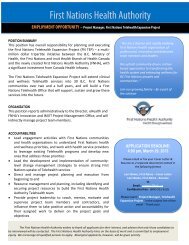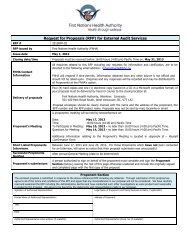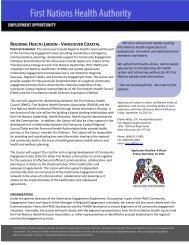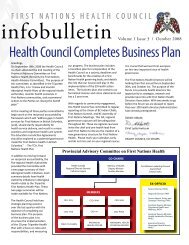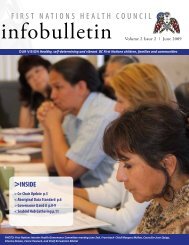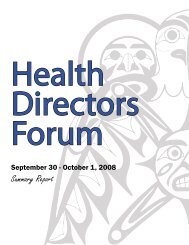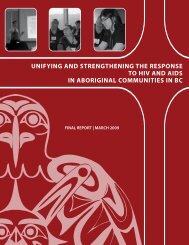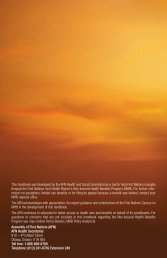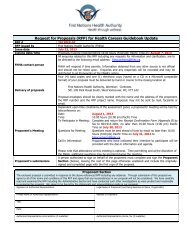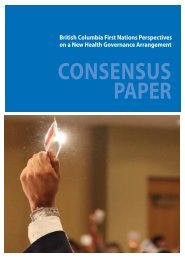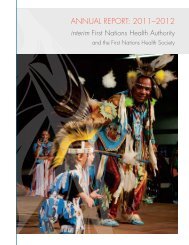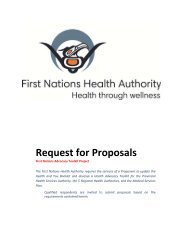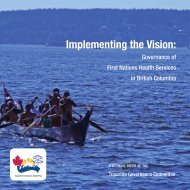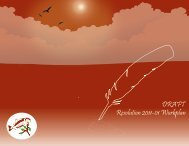pdf download - First Nations Health Council
pdf download - First Nations Health Council
pdf download - First Nations Health Council
You also want an ePaper? Increase the reach of your titles
YUMPU automatically turns print PDFs into web optimized ePapers that Google loves.
12<br />
the experience of <strong>First</strong> <strong>Nations</strong> having lost control<br />
of their lives. She acknowledged that the history<br />
was different in BC, and that the sense was that<br />
the new way forward was to organize.<br />
She spoke of the impacts of residential school<br />
and the impacts of the loss of land. There was<br />
a need to find a way to care for a group within<br />
the communities of <strong>First</strong> <strong>Nations</strong> that was made<br />
ill by what happened historically ... “we all love<br />
somebody who is either living that way, or who has<br />
died that way, someone who has been made very<br />
ill by all this trauma.”<br />
“Gathering Wisdom for a Shared Journey”<br />
speaks to the knowledge that <strong>First</strong> <strong>Nations</strong> Elders<br />
hold. One of the greatest gifts <strong>First</strong> <strong>Nations</strong> have<br />
is an understanding that manifests in a very loving<br />
and gentle way. <strong>Health</strong> is inextricable from love<br />
and care.<br />
ms. Keeper commented that proposal-driven<br />
funding does not work because most often the<br />
people that need the funding the most do not have<br />
the capacity to write proposals. Legal obligations<br />
aside, she noted that there was a moral obligation<br />
to deal with this. <strong>Health</strong> practitioners and<br />
politicians need to discuss the issues of love and<br />
caring as a way to move forward. She did not want<br />
to look forward to a future where <strong>First</strong> <strong>Nations</strong><br />
were giving up their collective rights and identity<br />
as Aboriginal peoples.<br />
ms. Keeper added that <strong>First</strong> <strong>Nations</strong> were at<br />
a turning point. Dialogue was begun and needs<br />
to be driven by the knowledge acquired from the<br />
grassroots level - particularly the Elders. She spoke<br />
of a colleague in Aboriginal <strong>Health</strong> working with<br />
<strong>First</strong> <strong>Nations</strong> in the north who was not allowed<br />
to speak Cree because she was not hired as an<br />
interpreter. This is a concrete example of the<br />
constrictions that continue to exist within the<br />
current system. She emphasized the need to think<br />
outside of the box, and to challenge the system.<br />
Working in television ms Keeper had met many<br />
non-native Canadians who felt that they knew her<br />
because they knew her television character. She’d<br />
had the opportunity to speak to many people who<br />
shared what they thought about the show, <strong>First</strong><br />
<strong>Nations</strong> people, or Canadians and their relationship<br />
to <strong>First</strong> <strong>Nations</strong>. She had learned that people<br />
really were good at heart; that colonial rule was<br />
a tradition of the British which they imposed on<br />
others as ‘part of their way‘.<br />
ms. Keeper recalled the story of a Cree<br />
character created out of the experience of<br />
starvation, called the Windigo, which represented<br />
the spirit of greed or rage. She had felt like a<br />
Windigo during her first years on Parliament Hill.<br />
She had grown up in a privileged life on the land,<br />
but was shocked by the level of privilege that<br />
non-<strong>First</strong> <strong>Nations</strong> people enjoyed in Canada. <strong>First</strong><br />
<strong>Nations</strong> had the ability to speak together and<br />
needed to speak in a good way. <strong>First</strong> <strong>Nations</strong> had<br />
to insist on what they wanted in moving forward.<br />
In response to a question, ms. Keeper<br />
confirmed that she was part of the parliamentary<br />
Aboriginal Affairs Committee and worked closely<br />
with the <strong>Health</strong> Committee. A driving force that<br />
encouraged her to get into politics was <strong>First</strong> Nation<br />
health issues and the reality that there was no<br />
legislation for <strong>First</strong> <strong>Nations</strong> health in Canada. There<br />
continued to be a significant discrepancy and lack<br />
of jurisdictional clarity surrounding Aboriginal<br />
health issues. There were human rights violations<br />
in terms of delivering health services for <strong>First</strong><br />
<strong>Nations</strong>. Some of her opportunities as a <strong>First</strong><br />
Nation member of Parliament included becoming<br />
aware of the issues; making her caucus members<br />
aware of the issues; inviting people to present<br />
at Standing Committees; and participating in the<br />
introduction of private members bills and motions.<br />
ms. Keeper concluded with a note that the<br />
Tripartite <strong>First</strong> <strong>Nations</strong> <strong>Health</strong> Plan model was<br />
very exciting because there was a whole new<br />
generation of Aboriginal youth, the fastest growing<br />
sector of the population - there was a need to<br />
find a way to take care of them. She wished<br />
participants the best, and thanked the forum for<br />
the opportunity to speak.<br />
II<br />
SECONd ANNUAl FORUm



